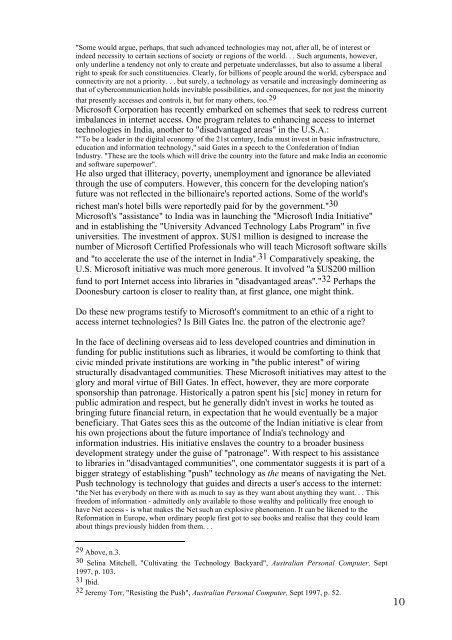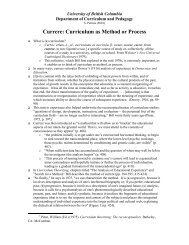ETHICAL BOUNDARIES AND INTERNET CULTURES
ETHICAL BOUNDARIES AND INTERNET CULTURES
ETHICAL BOUNDARIES AND INTERNET CULTURES
You also want an ePaper? Increase the reach of your titles
YUMPU automatically turns print PDFs into web optimized ePapers that Google loves.
"Some would argue, perhaps, that such advanced technologies may not, after all, be of interest or<br />
indeed necessity to certain sections of society or regions of the world. . . Such arguments, however,<br />
only underline a tendency not only to create and perpetuate underclasses, but also to assume a liberal<br />
right to speak for such constituencies. Clearly, for billions of people around the world, cyberspace and<br />
connectivity are not a priority. . . but surely, a technology as versatile and increasingly domineering as<br />
that of cybercommunication holds inevitable possibilities, and consequences, for not just the minority<br />
that presently accesses and controls it, but for many others, too. 29<br />
Microsoft Corporation has recently embarked on schemes that seek to redress current<br />
imbalances in internet access. One program relates to enhancing access to internet<br />
technologies in India, another to "disadvantaged areas" in the U.S.A.:<br />
""To be a leader in the digital economy of the 21st century, India must invest in basic infrastructure,<br />
education and information technology," said Gates in a speech to the Confederation of Indian<br />
Industry. "These are the tools which will drive the country into the future and make India an economic<br />
and software superpower".<br />
He also urged that illiteracy, poverty, unemployment and ignorance be alleviated<br />
through the use of computers. However, this concern for the developing nation's<br />
future was not reflected in the billionaire's reported actions. Some of the world's<br />
richest man's hotel bills were reportedly paid for by the government." 30<br />
Microsoft's "assistance" to India was in launching the "Microsoft India Initiative"<br />
and in establishing the "University Advanced Technology Labs Program" in five<br />
universities. The investment of approx. $US1 million is designed to increase the<br />
number of Microsoft Certified Professionals who will teach Microsoft software skills<br />
and "to accelerate the use of the internet in India". 31 Comparatively speaking, the<br />
U.S. Microsoft initiative was much more generous. It involved "a $US200 million<br />
fund to port Internet access into libraries in "disadvantaged areas"." 32 Perhaps the<br />
Doonesbury cartoon is closer to reality than, at first glance, one might think.<br />
Do these new programs testify to Microsoft's commitment to an ethic of a right to<br />
access internet technologies? Is Bill Gates Inc. the patron of the electronic age?<br />
In the face of declining overseas aid to less developed countries and diminution in<br />
funding for public institutions such as libraries, it would be comforting to think that<br />
civic minded private institutions are working in "the public interest" of wiring<br />
structurally disadvantaged communities. These Microsoft initiatives may attest to the<br />
glory and moral virtue of Bill Gates. In effect, however, they are more corporate<br />
sponsorship than patronage. Historically a patron spent his [sic] money in return for<br />
public admiration and respect, but he generally didn't invest in works he touted as<br />
bringing future financial return, in expectation that he would eventually be a major<br />
beneficiary. That Gates sees this as the outcome of the Indian initiative is clear from<br />
his own projections about the future importance of India's technology and<br />
information industries. His initiative enslaves the country to a broader business<br />
development strategy under the guise of "patronage". With respect to his assistance<br />
to libraries in "disadvantaged communities", one commentator suggests it is part of a<br />
bigger strategy of establishing "push" technology as the means of navigating the Net.<br />
Push technology is technology that guides and directs a user's access to the internet:<br />
"the Net has everybody on there with as much to say as they want about anything they want. . . This<br />
freedom of information - admittedly only available to those wealthy and politically free enough to<br />
have Net access - is what makes the Net such an explosive phenomenon. It can be likened to the<br />
Reformation in Europe, when ordinary people first got to see books and realise that they could learn<br />
about things previously hidden from them. . .<br />
29 Above, n.3.<br />
30 Selina Mitchell, "Cultivating the Technology Backyard", Australian Personal Computer, Sept<br />
1997, p. 103.<br />
31 Ibid.<br />
32 Jeremy Torr, "Resisting the Push", Australian Personal Computer, Sept 1997, p. 52.<br />
10

















